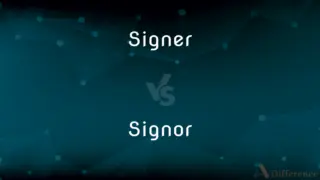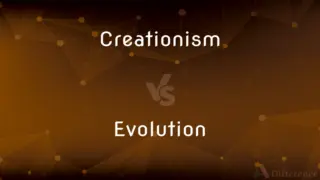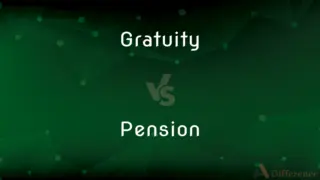Host vs. Emcee — What's the Difference?
By Tayyaba Rehman & Fiza Rafique — Updated on February 26, 2024
A host facilitates an event or gathering, focusing on guest management and overall flow, while an emcee (Master of Ceremonies) specifically focuses on announcing and presentation, guiding the event's program.

Difference Between Host and Emcee
Table of Contents
ADVERTISEMENT
Key Differences
The role of a host is broad, encompassing the overall responsibility for the success of an event or gathering, including welcoming guests, ensuring comfort, and managing the event's flow. An emcee, on the other hand, is primarily concerned with the public speaking aspects, such as making announcements, introducing speakers or performers, and keeping the audience engaged.
Hosts are integral to both formal and informal events, such as parties, meetings, or dinners, where their role can vary from organizing to ensuring the smooth execution of the event. Emcees are more commonly associated with events that require a structured program, like conferences, weddings, or award ceremonies, focusing on verbal communication to transition between segments of the event.
The skill sets for a host and an emcee, while overlapping, emphasize different areas. A host must be adept at planning, coordination, and guest relations. In contrast, an emcee needs strong public speaking skills, a good sense of timing, and the ability to engage and entertain an audience.
It's not uncommon for the roles of host and emcee to be performed by the same person in smaller or less formal events. However, in larger, more structured events, these roles are usually separated to allow each to focus on their specific responsibilities, ensuring the event runs smoothly and professionally.
Both hosts and emcees aim to enhance the experience of attendees, the host takes a behind-the-scenes approach to event management, whereas the emcee is front and center, directly interacting with the audience and guiding the event's program.
ADVERTISEMENT
Comparison Chart
Primary Focus
Overall event management and guest experience.
Public speaking, announcements, and guiding the program.
Event Type
Both formal and informal gatherings.
Events requiring a structured program.
Skills Required
Planning, coordination, guest relations.
Public speaking, engagement, sense of timing.
Role
Behind-the-scenes management and facilitation.
Front and center, directly interacting with the audience.
Common Settings
Parties, meetings, dinners.
Conferences, weddings, award ceremonies.
Compare with Definitions
Host
Ensures guest comfort and satisfaction.
The host went out of his way to accommodate all guest requests.
Emcee
Specializes in making announcements and introducing speakers or performers.
The emcee kept the audience engaged throughout the award ceremony.
Host
May take a behind-the-scenes role in event facilitation.
The host quietly resolved every issue that arose during the conference.
Emcee
Focuses on verbal communication and audience interaction.
As the emcee, he introduced each segment of the program with a joke.
Host
A person responsible for welcoming and taking care of guests at an event.
As the host, she ensured everyone felt welcomed at the dinner party.
Emcee
Requires strong public speaking skills.
The emcee's eloquent speech set the tone for the evening.
Host
Oversees the smooth execution of events.
The host coordinated all the event details flawlessly.
Emcee
Keeps the event flowing according to the program.
The emcee smoothly transitioned the event from speeches to the musical performance.
Host
Can be involved in both planning and managing the event.
The event host spent weeks planning the perfect wedding reception.
Emcee
Often the visible face of the event, directly addressing the audience.
The emcee’s charisma made the charity gala a memorable event.
Host
One who receives or entertains guests in a social or official capacity.
Emcee
A master of ceremonies
A tuxedoed emcee strode to the middle of the stage
Host
One that furnishes facilities and resources for a function or event
The city chosen as host for the Olympic Games.
Emcee
An MC at a club or party.
Host
To serve as host to or at
"the garden party he had hosted last spring" (Saturday Review).
Emcee
Perform as an MC
I ran the contest while Alex emceed from the DJ booth
Host
One which receives or entertains a guest, socially, commercially, or officially.
A good host is always considerate of the guest’s needs.
Emcee
To act as master of ceremonies.
Host
A person or organization responsible for running an event.
Our company is host of the annual conference this year.
Host
Any organization that provides resources and facilities for a function or event;
Atlanta was chosen to be host for the Olympic Games
Common Curiosities
What skills are important for a host?
Important skills for a host include planning, coordination, and guest relations.
Are hosts necessary for informal gatherings?
While not always labeled as such, hosts play a crucial role in the success of both formal and informal gatherings by managing and facilitating the event.
What is the main difference between a host and an emcee?
The main difference is that a host focuses on overall event management and guest experience, while an emcee concentrates on public speaking, announcements, and guiding the event's program.
What skills are important for an emcee?
An emcee needs strong public speaking skills, a good sense of timing, and the ability to engage and entertain an audience.
Can one person be both the host and emcee of an event?
Yes, in smaller or less formal events, one person can perform both roles, but in larger events, they are often separated.
Do emcees need to be professional speakers?
While not strictly necessary, professional speaking skills greatly enhance an emcee's effectiveness in engaging and entertaining an audience.
How do hosts and emcees enhance an event?
Hosts ensure the event runs smoothly and guests are satisfied, while emcees keep the audience engaged and ensure the program flows seamlessly.
Is the role of an emcee limited to large events?
Emcees are most commonly associated with larger events that require a structured program, but they can be beneficial in adding professionalism and structure to smaller events as well.
What makes a good event host?
A good event host is organized, attentive to guests' needs, and capable of managing the many details of event planning and execution.
Are there professional training programs for hosts and emcees?
Yes, there are professional training programs and workshops that focus on developing the skills necessary for both roles.
What is the significance of having an emcee at an event?
The significance lies in the emcee's ability to professionally guide the event's program, ensure timing is maintained, and enhance the overall experience for the audience with their presence and presentation skills.
What makes a good emcee?
A good emcee is charismatic, articulate, and skilled at keeping the audience engaged while ensuring the event adheres to its scheduled program.
Can hosts and emcees work in tandem?
Yes, in many events, hosts and emcees work together to ensure both the logistical and programmatic elements of the event are successful.
How do hosts handle unexpected issues during an event?
Hosts handle unexpected issues by quickly assessing the situation, making decisions to resolve the issue, and adjusting the event plan as necessary to minimize disruption.
How do emcees keep an audience engaged?
Emcees keep an audience engaged through dynamic speaking, humor, and interactive elements that maintain interest and energy throughout the event.
Share Your Discovery

Previous Comparison
Dominant vs. Master
Next Comparison
Fps vs. BpsAuthor Spotlight
Written by
Tayyaba RehmanTayyaba Rehman is a distinguished writer, currently serving as a primary contributor to askdifference.com. As a researcher in semantics and etymology, Tayyaba's passion for the complexity of languages and their distinctions has found a perfect home on the platform. Tayyaba delves into the intricacies of language, distinguishing between commonly confused words and phrases, thereby providing clarity for readers worldwide.
Co-written by
Fiza RafiqueFiza Rafique is a skilled content writer at AskDifference.com, where she meticulously refines and enhances written pieces. Drawing from her vast editorial expertise, Fiza ensures clarity, accuracy, and precision in every article. Passionate about language, she continually seeks to elevate the quality of content for readers worldwide.















































